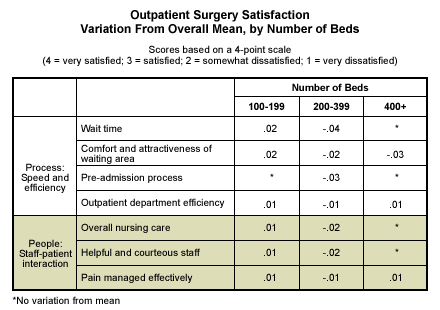The second in a series on the effects of hospital size and patient satisfaction
In the emergency department, small hospitals have an advantage over larger hospitals when it comes to patient satisfaction on key items, as measured in Â鶹´«Ã½AV's healthcare database. Hospitals with 100 to 199 beds scored higher than the two larger bed-size categories on six satisfaction items that most differentiate average emergency departments from best-practice emergency departments (see "Does Hospital Size Matter in the Emergency Room?" in Related Items). Does this same relationship hold true for satisfaction with outpatient surgery departments?
Â鶹´«Ã½AV researchers identified seven question items regarding outpatient surgery that most differentiate best-practice hospitals (those scoring in the 80th percentile of the database) from average hospitals (those scoring in the 50th percentile). Four of the outpatient surgery items are "process" items, meaning they relate primarily to hospitals' operations, and three are "people" items, relating primarily to employee-patient interaction.
To assess the impact of hospital size on these key items, Â鶹´«Ã½AV divided the hospitals in our database into three size categories -- 100 to 199 beds, 200 to 399 beds, and 400+ beds -- and looked at how the mean score for each size category varied from the overall mean score for each item. Results show that variation in satisfaction according to a hospital's number of beds is much smaller for outpatient surgery departments than it is for emergency departments. This finding reflects previous research showing that variation in patient satisfaction scores overall is smaller for outpatient surgery departments than it is for emergency departments (see "Where Do the Best Outpatient Surgery Facilities Excel?" in Related Items).

While the outpatient surgery areas of hospitals with 100 to 199 beds do score higher than those of the larger hospitals on most of the items, the differences are generally too small to suggest a substantive impact. Moreover, on most of the items there is no linear relationship with respect to size. The average scores of hospitals with 400+ beds are actually slightly higher than those of hospitals with 200 to 399 beds.
Of the four service areas for which Â鶹´«Ã½AV measures patient satisfaction, outpatient surgery departments are the highest scoring and emergency departments the lowest scoring. Typically, higher quality ratings overall imply lower variation among ratings of individual products and services -- so it's not surprising that the higher-scoring group of outpatient surgery departments shows less variation by size than the lower-scoring group of emergency departments.
What Explains These Differences?
Of the variation that does exist between outpatient surgery departments in larger and smaller hospitals, satisfaction with wait time is the most notable. It seems logical to assume that larger volumes tend to put more of a strain on hospital systems and resources, increasing wait times. But this possibility does not explain the fact that hospitals with 400 beds or more score higher on satisfaction with wait time than hospitals with 200 to 399 beds.
But the largest hospitals may also have an advantage here. In the smallest hospitals, outpatient surgery departments often efficiently share operating rooms (ORs) with inpatient departments, decreasing wait times for outpatient surgery patients. Hospitals with 200 to 399 beds are still likely to share ORs between outpatient surgery and inpatient, but sharing may be less efficient because of increased volume. As hospitals grow to exceed 400 beds, they are more likely to implement separate outpatient surgery areas with their own ORs, thereby increasing efficiency and reducing wait time.